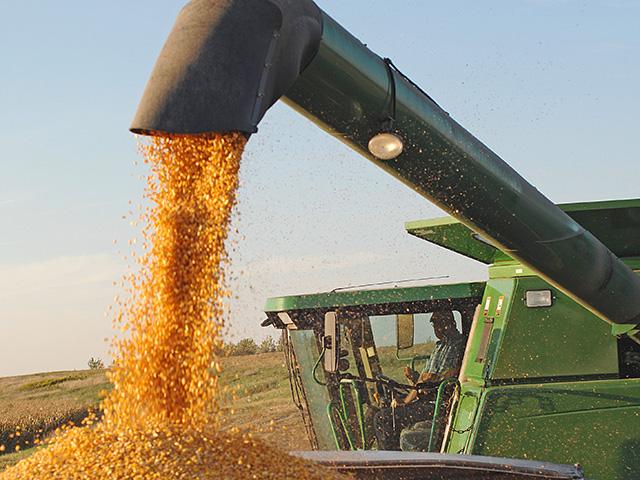Economists Size Up Ag Economy in 2024
Economist Says Agriculture Pressured by Inflation, Expected Downturn in Economy, Crop Prices
LINCOLN, Neb. (DTN) -- As if working in agriculture isn't risky enough, U.S. farmers face economic headwinds in 2024 including continued concerns about inflation, lower commodity prices, talk of a national recession and an upcoming national election, a group of agriculture economists told ag reporters Wednesday during a special event hosted by the North American Agricultural Journalists.
Perhaps at the top of the list is how the Federal Reserve might continue to address inflation across the economy.
Roland Fumasi, head of RaboResearch Food and Agribusiness, said Rabo economists expect the U.S. economy to take a downturn at some point this year.
"Sticky inflation will continue to challenge the Fed," Fumasi said.
"Our economists are expecting a pullback in GDP (gross domestic product) in the U.S. coupled with rising unemployment, those things combined equal a recession. We are still expecting some type of recession in the U.S., but we expect it to be a very light recession."
Fumasi said preliminary numbers during the past three weeks show a light recession is expected in the first or second quarter of 2024.
In addition, he said there is some question about what the Fed will do with interest rates. Rabo economists, Fumasi said, are expecting the Fed to cut interest rates three times in 2024, beginning around June.
"Expect (previous) interest rate hikes to start to bite and start to bring unemployment up," he said.
"The U.S. economy has continued to be extremely resilient on the consumer-demand side. It will take longer to get inflation back to about 2% at the end of 2025. It's going to take longer than some economists think out there. Bottom line, we expect rates to stay a bit higher for longer."
When it comes to the ag economy, Fumasi said there will continue to be some downward pressure on corn and soybean prices, leading to some negative net-cash farm income reported.
"We are expecting those incomes because prices have significantly pulled back particularly on the corn side," he said.
P[L1] D[0x0] M[300x250] OOP[F] ADUNIT[] T[]
"Fertilizer costs have come down, that helps. But some other costs like labor are stickier. Those never tend to go down. With weakening prices producers give back a bit of cash."
Fumasi said farmers are faring OK because farms have strengthened their balance sheets. Better soybean markets will lead a farm income recovery by 2026, he said, as improving soybean margins are expected to be the biggest contributor to improved income.
FOOD INFLATION
Michael Swanson, chief ag economist at Wells Fargo's Agri-Food Institute, said one of the little talked about aspects of the economy is food inflation.
According to the U.S. Bureau of Labor Statistics, the average price of food in the U.S. increased by 2.9% in 12 months as of November 2023. Food inflation reached as high as 11.4% as recently as August 2022, which was the highest number since May 1979.
Swanson said the recent move in food inflation was abnormal but expects it to come down in 2024.
"I spend a lot of time visiting with retailers, producers, one point make to them is that the U.S. has typically very low food inflation," he said.
"We have very ample supplies. What we had recently is very unusual. It was not about a lack of food ingredients; it was about disruption in transport, production and so on. It broke a long-term paradigm in the food market.
"As a retailer, top-end revenue jumped higher. We're going back to what we had before. Retailers are going back to food manufacturers and saying, 'We don't want more price increases.' Is backward pressuring the food system in the U.S. As we see this backwards pressure against suppliers, it's going to change the dynamic a lot."
CROPLAND VALUES
Although cropland values have been "super resilient" amidst volatility in the ag economy, Fumasi said he expects those values to level out.
"When you look at transactions and regions it's all over the board," he said.
"The best ground in Iowa used for row crops is at very high prices. How can they pay so much for ground? Growers look at land as a multi-generational asset. A farmer is going to continue to want to grow their operation. I think we'll go through a period for five years where we will see cropland values go flat."
TRADE POLICY
With a presidential election upcoming in November rural American voters face the prospects of yet another change in trade policy in a new administration.
How the next administration approaches ag exports will be critical.
Dan Sumner, professor of agriculture and resource economics at the University of California, Davis, said there is the potential for launching another trade war with China.
"China has long been important in markets across field crops," he said.
"China also is a major producer of commodities and it competes in the export markets. We've got trouble with growth in China. Geopolitically it is a big issue for the United States, but not a good thing for U.S. agriculture. We spent $25 billion in compensation when we went through (trade war with China). Exports are a big driver for commodities. If we do a trade war and don't compensate farmers for losses, then there will be serious losses. It's problematic. I don't have any insights into the geopolitics of this at all. I think it's something that ought to be on everybody's horizon."
Read more on DTN:
"Farmland Values and Fed Policy Risks," https://www.dtnpf.com/…
Todd Neeley can be reached at todd.neeley@dtn.com
Follow him on X, formerly known as Twitter, @DTNeeley
(c) Copyright 2024 DTN, LLC. All rights reserved.



